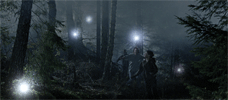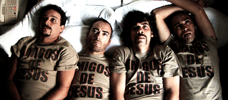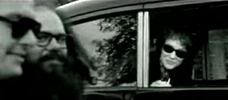Reviews
Leonard Abrahamson
Ireland, 2007
Credits
Review by Tom Huddleston
Posted on 10 October 2007
Source Soda Pictures 35mm print
Categories The Times BFI 51st London Film Festival
More so than its British equivalent, the Irish national cinema seems to take many cues from the American independents: stories of isolated loners, uncertain love affairs and rural disaffection clearly influenced by the likes of Jim Jarmusch and Hal Hartley. Like this year’s Small Engine Repair, Garage is a bleakly comic study of a frustrated outsider living on the fringes of a small country town. But Garage is not tied to its obvious antecedents, blending the familiar with the wholly surprising, eschewing predictable sentimentality in favour of a warm, dry wit, and a steadily encroaching sense of impending, unavoidable tragedy.
In its overall narrative arc, the film resembles nothing so much as The Station Agent: a lonely but essentially contented misfit is forced to interact with others, and finds himself opening up in the process. In this case the central figure is Josie, a slow-witted garage attendant and local joke who derives meagre satisfaction from the small things in his life: a conversation with a passing trucker, feeding an apple to a chained horse, a quiet pint in the evening. The landscape of Josie’s life is as empty as the featureless agrarian backdrop, and although he seems to long for something more he is trapped by circumstance and his own deep-seated fear and bewilderment.
But Josie is forced to deal with the wider world when the garage owner hires on extra help in the form of David, a bumfluff moustached, Korn t-shirt wearing 15 year old metalhead. David is initially sceptical of the arrangement, but Josie wins him over by plying him with cans of beer for himself and his small band of friends. The two form a halting friendship, and Josie finds himself gradually accepted into a wider circle for the first time in his life.
Lenny Abrahamson’s second collaboration with writer Mark O’Halloran follows on the heels of their critically acclaimed Adam and Paul, and utilises a similar combination of dry humour, acute character observation and dark tragedy. Here, those concerns find themselves entirely encapsulated in the character of Josie, a man who simply can’t relate meaningfully to others, or to the wider world: he has no faculties with which to understand the nuance and relative subtlety with which normal people conduct their daily relationships. But he is a good man trying to be better, seeking nothing but affection and companionship, and it is his mistreatment at the hands of an unthinking world that provides the film’s clearest insights, and it’s most effective emotional barbs.
As Josie, comedian Pat Shortt carries the film almost single-handedly. A familiar face on Irish television, he manages to convey Josie’s backwardness without resorting to caricature or mugging—most of Josie’s comic moments come with the character, not at his expense. As a purely physical performance it is quite astonishing. At the outset, the character is essentially little more than a series of tics and affectations, but these are so well judged and convincing that a sense of Josie’s personality is communicated almost immediately. We are encouraged to sympathise with Josie, but never really allowed to relate to him, and certainly never given much of a sense of depth in the character. But this in fact serves the film well: we are forced into a position much like the other figures in the film, observing and judging Josie, wondering what our own reactions might be to this awkward, shambling but distinctly recognisable figure.
As David, first-timer Conor J. Ryan gives a performance of quiet confidence: although his character is a bag of nerves, the actor never seems adrift in the role, making David the closest thing to an audience identification figure. The incidental characters are not exactly memorable but they are convincing, lending the world of a film a sense of authenticity which Shortt’s more mannered performance might have prevented.
Everything about Garage feels considered, from the excellent casting to the spare but involving script, from the near-absence of music to the very particular choice of locations. The photography is simple but effective, utilising long, mostly static camera positions, isolating the actors within the barren landscape. The film is not easy viewing—a slow, deliberate but essentially lighthearted first half gradually gives way to a sense of bleak desperation, and the ending is inevitably devastating. But Garage has its rewards, most notably in Pat Shortt’s performance, and the very real sense of hapless humanity which he invokes.
More The Times BFI 51st London Film Festival
-

Island of Lost Souls
2007 -

Garage
2007 -

Exodus
2007 -

Friends of Jesus
2007 -

We Want Roses Too
2007 -

The Trap
2006 -

Captain Ahab
2007 -

Shotgun Stories
2007 -

Savage Grace
2007 -

The Assassination of Jesse James by the Coward Robert Ford
2007 -

The World Unseen
2007 -

Things We Lost In The Fire
2007 -

Lions for Lambs
2007 -

Talk to Me
2007 -

Redacted
2007 -

Battle For Haditha
2007 -

Chaotic Ana
2007 -

Angel
2007 -

Juno
2007 -

Fay Grim
2006 -

Reservation Road
2007 -

I’m Not There
2007
We don’t do comments anymore, but you may contact us here or find us on Twitter or Facebook.



